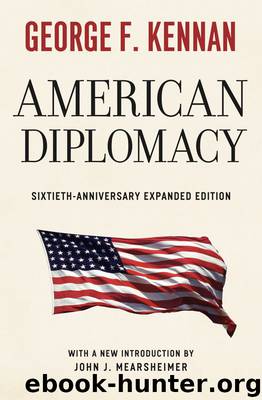American Diplomacy: Sixtieth-Anniversary Expanded Edition (Walgreen Foundation Lectures) by Kennan George F

Author:Kennan, George F. [Kennan, George F.]
Language: eng
Format: epub
Publisher: University of Chicago Press
Published: 2012-06-15T00:00:00+00:00
FIVE
World War II
THE CAMBRIDGE HISTORIAN, Herbert Butterfield, recently wrote: “Behind the great conflicts of mankind is a terrible human predicament which lies at the heart of the story: . . . Contemporaries fail to see the predicament or refuse to recognize its genuineness so that our knowledge of it comes from later analysis. It is only with the progress of historical science on a particular subject that men come really to recognize that there was a terrible knot almost beyond the ingenuity of man to untie.”1
I do not suppose that this was any more true of World War II than of any other great conflict. But the fact remains that it was a war poorly understood by the peoples who fought it on the democratic side, and particularly ourselves; and I am sure that this lack of understanding of what was involved in the conflict itself has much to do with the great bewilderment and trouble we seem now to be experiencing in our attempts to adjust ourselves to the situation it left in its train.
It occurs to me that perhaps the most helpful thing to understand about this recent war is the extent to which it was prejudiced, as a military encounter, before it was begun—the extent to which, you might say, it was not fully winnable.
Let me explain how this was. Before the war began the overwhelming portion of the world’s armed strength in land forces and air forces had accumulated in the hands of three political entities—Nazi Germany, Soviet Russia, and Imperial Japan. All these entities were deeply and dangerously hostile to the Western democracies. As things stood in the late thirties, if these three powers were to combine their efforts and stick together in a military enterprise, the remaining Western nations plainly had no hope of defeating them on the land mass of Europe and Asia, with the armaments at hand or even those in prospect. In Europe and Asia, Western democracy had become militarily outclassed. The world balance of power had turned decisively against it.
I am not claiming that this was perceived, or would have been easy to perceive, by Western statesmen. But I believe it was a reality. And, as such, it plainly limited the actual prospects for the West, if war were to come. Of the three totalitarian powers, Japan was the only one which could conceivably be defeated by the democracies without invoking for this purpose the aid of one of the other totalitarian powers. In the case of Germany and Russia, circumstances were bitter. Together, they could not be defeated at all. Individually, either of them could be defeated only if the democracies had the collaboration of the other.
But such collaboration, if permitted to proceed to the point of complete victory, would mean the relative strengthening of the collaborating power and its eventual appearance as a greedy and implacable claimant at the peace table. Not only that: any war in which one of these two powers was fighting on the side
Download
This site does not store any files on its server. We only index and link to content provided by other sites. Please contact the content providers to delete copyright contents if any and email us, we'll remove relevant links or contents immediately.
| Africa | Americas |
| Arctic & Antarctica | Asia |
| Australia & Oceania | Europe |
| Middle East | Russia |
| United States | World |
| Ancient Civilizations | Military |
| Historical Study & Educational Resources |
Cat's cradle by Kurt Vonnegut(15334)
Pimp by Iceberg Slim(14484)
4 3 2 1: A Novel by Paul Auster(12372)
Underground: A Human History of the Worlds Beneath Our Feet by Will Hunt(12085)
The Radium Girls by Kate Moore(12017)
Wiseguy by Nicholas Pileggi(5769)
The Fire Next Time by James Baldwin(5431)
Perfect Rhythm by Jae(5398)
American History Stories, Volume III (Yesterday's Classics) by Pratt Mara L(5298)
Paper Towns by Green John(5177)
Pale Blue Dot by Carl Sagan(4996)
A Higher Loyalty: Truth, Lies, and Leadership by James Comey(4952)
The Mayflower and the Pilgrims' New World by Nathaniel Philbrick(4490)
The Doomsday Machine by Daniel Ellsberg(4484)
Killers of the Flower Moon: The Osage Murders and the Birth of the FBI by David Grann(4435)
The Sympathizer by Viet Thanh Nguyen(4384)
Too Much and Not the Mood by Durga Chew-Bose(4337)
The Borden Murders by Sarah Miller(4312)
Sticky Fingers by Joe Hagan(4188)
